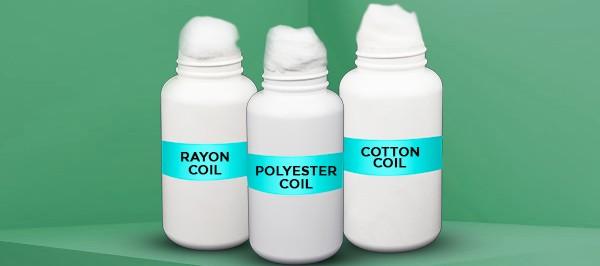









Pharmaceutical coils are specialized materials used primarily in the packaging and transportation of pharmaceutical products, such as tablets, capsules, and soft gels. They serve as fillers or protective agents to maintain the integrity, stability, and freshness of these products during shipping and storage. Below is an overview of the main types of pharmaceutical coils and their uses, based on their material properties and applications.


• Description: Made from 100% bleached, absorbent cotton, these are natural fiber coils that are biodegradable.
• Properties: Highly absorbent, soft, and nontoxic, cotton coils can take in moisture generated by tablets or capsules inside a container.
• Uses: Commonly used as fillers in bottles of solid oral dosage forms (e.g., tablets and capsules) to prevent breakage and absorb excess moisture, thereby maintaining a dry environment and preserving product stability.

• Description: Synthetic coils derived from regenerated cellulose, offering a soft and flexible texture.

• Properties: Non-toxic, odorless, biodegradable, and non-absorbent, making them ideal for maintaining a stableenvironmentwithoutalteringmoisturelevels.
• Uses: Employed as fillers in bottled medicines, particularly for tablets and capsules, to prevent damage during transit. Rayon coils provide cushioning and ensure the stability of pharmaceutical products by protectingthemfromphysicalimpact.


• Description: Made from polyester fibers (a petroleum-based product), these coils are white, soft,andresilient.
• Properties: Non-toxic, non-absorbent, odorless, and non-fluorescent, polyester coils resist moisture uptake and maintain their shape under varyingconditions.
• Uses: Primarilyusedasfillersforsensitivesoft-gel capsules, which are prone to damage from moisture and heat. Polyester coils provide a protective space, ensuring safe storage and transportation while helping capsules retain their shapeandsize.


Pharmaceutical coils have a range of practical applications in the pharmaceutical industry, driven by their protective and stabilizing properties:
During Transportation: Coils act as cushioning agents, filling empty spaces in bottles or containers to prevent tablets, capsules, or soft gels from shifting, breaking, or losing their shape during shipping.
Moisture Control: Depending on the type, coils either absorb excess moisture (e.g., cotton) or act as barriers to prevent moisture ingress (e.g., polyester, rayon, foam plugs), maintaining an optimal environment for moisturesensitive medications.


Stability and Freshness: By reducing physical damage and controlling environmental factors like humidity, coils help preserve the potency and shelf life of pharmaceutical products.
Packaging Filler: Coils fill voids in packaging, ensuring that contents remain secure and intact, which is especially critical for fragile or sensitive items like soft-gel capsules.

Safe and Non-Toxic Storage: Made from inert, non-toxic materials, these coils ensure that they do not contaminate or react with the pharmaceutical products they protect.

Pharmaceutical coils are typically available in various sizes (e.g., measured in grams per yard, such as 9gm, 12gm, 16gm) to suit different container dimensions and product needs. They are manufactured under strict standards (e.g., USP and EP guidelines) to ensure quality and safety for pharmaceutical use.
While the term "pharmaceutical coils" can occasionally refer to other contexts (e.g., coils in drug delivery systems or HVAC applications), the above focuses on their predominant role in packaging, as this aligns with the most common industry usage.


In summary, cotton, rayon, polyester, and foam plug coils each offer unique properties tailored to specific pharmaceutical needs, collectively ensuring that medicines remain safe, stable, and effective from production to consumer use.



